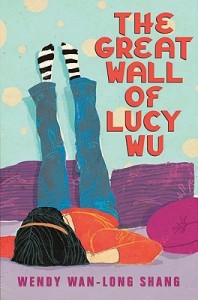Today I’m talking with Wendy Wan-Long Shang about her new book, The Great Wall of Lucy Wu. When I talk to Wendy we usually aren’t sitting, we’re doing something else. Pacing, for example, or playing tennis badly. So I figured that today, instead of asking you to join us on my virtual couch, I’d have you meet us at the courts in Falls Church. Pretend my shoulder isn’t still sore from early fall, and that I just hit a serve that Wendy could actually return, as opposed to whacking the ball over the fence. Pretend that we’re working off every cookie we consumed between Halloween and New Year’s.

Wendy grew up Chinese American in Northern Virginia. I grew up Jewish in Southwest Virginia. We are linked by being The Only One and by a really bad 80s soundtrack. Plus, we’re in the same critique group. I was lucky enough to read Lucy Wu before it became a bound book and I have been lucky enough to read it again and again since it acquired a hard cover, with Wendy’s name printed on it in purple. (Details on how to enter to win a signed paperback copy at the end of this post.)
Me: This is the first manuscript you ever wrote, and it’s being published by Scholastic. Why shouldn’t we hate you?
Wendy: (Laughing) I get your point, but you shouldn’t hate me because I’ve got hundreds of pages in the drawer that I’ve written since then that will probably never see the light of day again.
Me: (With another perfect serve.) You got your degree in law, as did a whole bunch of other children’s writers I know. Is that just a coincidence? Or is there something that makes the transition from law to children’s writing a natural fit?
Wendy: (With a perfect return.) I know – it’s crazy, right? Louis Sachar, Rebecca Stead, Francisco X. Stork and Kathy Erskine, just to name a few off the bat. And in our own writing group, Moira Donohue. Studying the law definitely instills a daily writing practice, an analytical approach to writing and reading with a sharp eye, which are skills any writer needs. As for writing for children specifically, perhaps after writing for judges and other lawyers, it’s a relief to write for a more discerning and appreciative audience.
Read on



